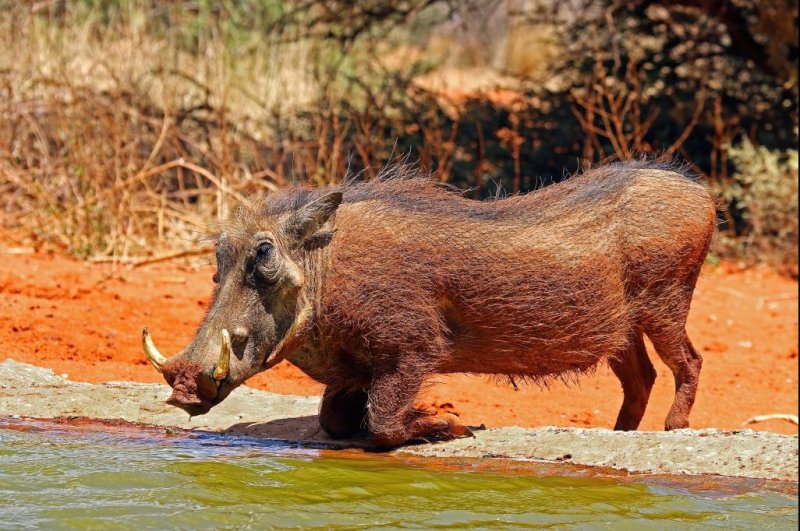Despite religious taboos against the consumption of pigs and monkeys in the Muslim-dominated regions of West Africa, researchers have found evidence of increased demand for warthogs and green monkeys at bushmeat markets in rural Guinea. Photo by Charles Sharp/
Wikimedia Commons
Sept. 18 (UPI) -- Researchers have identified a shift in the bushmeat trade in and around Niger National Park in Guinea, West Africa.
New survey data, published Friday in the journal Oryx, revealed in an uptick in the trade of several species that forage on local crops, including the green monkey, Chlorocebus sabaeus, and warthog, Phacochoerus africanus.
The discovery suggests economic realities have eroded cultural taboos against the killing and consumption of monkeys and wild pigs in West Africa, a predominantly Muslim region.
Researchers were able to identify fluctuations in the bushmeat, or wildmeat, trade by comparing more recent market survey data, collected between 2011 and 2017, with data collected during the 1990s and between 2001 and 2011.
"No other study to our knowledge has really explored temporal changes when it comes to the wild meat trade, and our study clearly highlights key shifts in this regard," lead study author Tatyana Humle, professor of ecology and conservation at the University of Kent in Britain, told UPI.
To collect accurate data, Humle said it's important for researchers to build trusting relationships with wildmeat vendors and help them understand the purpose of the study. It's also important for researchers not to interfere in market activities.
During regular visits to local markets, Humle's research team recorded where wildmeat was being sold, as well as what types of wildmeat -- at the species level, whenever possible -- was available for sale.
The market data comparison showed that fluctuations in Guinea's wildmeat trade are being largely driven by increases in rural demand. Bushmeat trade patterns have remained fairly stable in the city of Faranah over the last few decades.
"In Guinea, like many other countries in the region, rural people in particular depend heavily on wildmeat for protein consumption and income," Humle said. "It is hence critical to understand what is going on in order to more effectively align conservation actions with the livelihoods challenges faced by people in these localities."
Researchers found small mammals dominate the bushmeat trade in Guinea, especially species that feed on local crops. With a single kill, farmers can both protect their crops and make some extra money.
"Increased trade in crop-foraging wildlife species is potentially a trend that we expect to see elsewhere as both subsistence and commercial agricultural activities and other land use conversion practices are spreading across landscapes, encroaching into habitats utilized by wildlife," Humle said.
The wildmeat trade presents a variety of risks, including an increased risk of zoonoses, diseases that jump between wildlife and both people and livestock.
"The international trade in wildlife is one of the major threats to biodiversity," Humle said.
The wildmeat trade can also lead to local extinctions and significant biodiversity losses, resulting in lost ecological services, such as pollination and seed-dispersal of critical fruit trees.
Researchers hope their market surveys can help conservationists develop more effective strategies to curb the growth of the wildmeat trade.
"Research is key to combat the growth of the wildmeat trade, as without understanding the patterns and drivers we cannot identify in concert with the people involved in this activity effective solutions to tackle the trade," Humle said.
"It is also vital that research findings inform policy and community development and conservation actions," she said. "Law enforcement is futile on its own, unless drivers are understood and addressed adequately."















